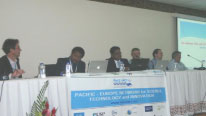With the PACE-Net Plus project (http://plus.pacenet.eu/) the European Union (EU), which maintains a long standing relationship with the Pacific, aims to reinforce ST&I cooperation with this region and promote the development of mutually beneficial partnerships, notably through Horizon 2020, the EU framework programme for multi- lateral research and innovation (and the largest research funding programme in the world).
PACE-Net Plus took part in the Third International UN Conference on Small Developing States (SIDS) dedicated to “Sustainable Development through Genuine and Durable Partnerships” (http://www.sids2014.org/). The project participated in a side-event that was co-organised by PACE-Net Plus project partner the National University of Samoa (NUS), and project coordinator the Institut de recherche pour le développement (IRD).
With the support of the INCONTACT2020 project (Supporting the International Dimension of Horizon 2020) (http://www.ncp-incontact.eu/), Rado Faletič from Montroix Pty Ltd (one of PACE-Net Plus’s Australian partners) presented the opportunities and benefits of Horizon 2020 for SIDS. He also gave an overview of some recent projects involving SIDS countries in EU projects, and updated the audience with the upcoming calls from the European Commission (EC).
UNIDO (the UN Industrial Development Organization), the partner coordinating the core component of the project dedicated to innovation, was represented by Ludovico Alcorta who outlined the main features of innovation in the SIDS group, noting that the mapping undertaken in the Pacific on this topic is the first of its kind.
In the framework of its support to regional partnerships, PACE-Net Plus also gave the floor to representatives of two regional observatories, the GOPs (the South Pacific Integrated Observatory for Environment and Terrestrial and Marine Biodiversity, represented by Bernard Pelletier of IRD) and O2C3 (the new Oceanian Observatory on the Consequences of Climate Change, represented by Victor David of IRD), thus demonstrating some existing and potential benefits of regional cooperation.
In order to better contribute to the EU-Pacific policy dialogue, the project also intends to facilitate further regional integration and cooperation. In this context, the representative of the Oceania 21 Summit (Anthony Lecren, a Member of the Government of New Caledonia) was invited to present this initiative and its focus on the relationship between traditional knowledge and heritage and research in ST&I.
Officials of the EU delegation in Fiji and the EC in Brussels attended this side-event as well as delegates of the Government of New Caledonia. Among other participants in this SIDS side-event were representatives from SPC (Secretariat of the Pacific Community)), USP (University of the South Pacific), SPREP (Secretariat of the Pacific Regional Environment Programme) and ANU (The Australian National University).
During the remainder of 2014, PACE-Net Plus will hold a number of think tanks in Europe and in the Pacific on Non-Communicable Diseases, Food Security, Water & Waste Management, Infectious Diseases, Coastal Ecosystems & Ciguatera, Mining & Its Environment and Climate Change Observation Systems. The project’s first bi-regional policy dialogue platform will take place in December 2014 in Auckland (New Zealand).




